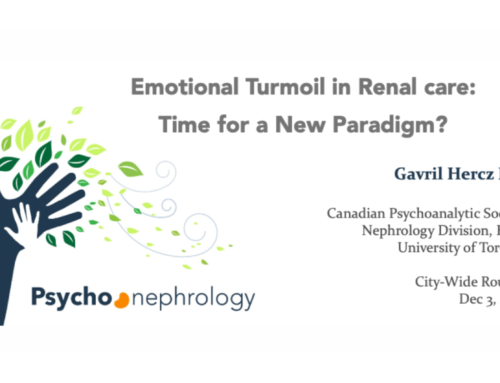
Reclaiming Identity in Chronic Kidney Disease
Chronic kidney disease (CKD) is often described in terms of lab values, treatment regimens, and survival statistics. Yet beneath the clinical surface lies a profound psychological reality: patients struggle not only with physical decline but with identity loss, depression, fear, and existential distress. Recent studies shed light on these hidden burdens, offering pathways for reclaiming selfhood beyond the diagnosis.
For many patients, CKD transforms their daily lives into cycles of medical appointments, dietary restrictions, and dialysis sessions. The shift from being a parent, worker, or caregiver to “the patient” can erode self-esteem and sense of identity. This phenomenon—known as identity loss in chronic illness—is rarely discussed in nephrology, yet it profoundly shapes patient well-being. One patient put it simply: “I don’t recognize myself anymore. My life revolves around dialysis.”
The psychological toll of CKD is well documented. Research has shown that a significant proportion of patients experience major depressive symptoms, with prevalence rising even higher among those undergoing dialysis. Elevated rates of suicidal ideation and attempts underscore the urgent need for integrated psychological care. These findings validate what many patients express: the emotional burden of CKD is not incidental—it is central to the illness experience. As one dialysis patient admitted, “Sometimes I think I can’t do this anymore.”
The transition to dialysis is also accompanied by existential anxiety. Studies reveal that half of patients initiating dialysis report moderate to extreme fear of death. This fear is not simply about mortality—it reflects uncertainty, loss of control, and the perception of dialysis as a life-prolonging but not curative intervention. Such findings highlight the importance of addressing existential distress alongside medical treatment. Ignoring these fears risks compounding identity loss and emotional suffering. A new dialysis patient described it poignantly: “I am so afraid of dying. Dialysis feels like a countdown.”
Another critical dimension comes from research into how patients perceive dialysis itself. Those who view it as a palliative, life-prolonging treatment report higher levels of psychological distress and poorer quality of life. When dialysis is framed as “survival maintenance” rather than “life enhancement,” patients often feel trapped in a cycle of hopelessness. This perspective reinforces identity erosion: patients begin to see themselves not as living, but merely existing. One long-term dialysis patient expressed it starkly: “It gets harder every day. I’m not sure what I’m fighting for.”
Despite these challenges, research and clinical practice suggest strategies for rediscovery. Narrative therapy encourages patients to tell their story beyond the diagnosis, reframing identity around resilience and values. Mindfulness and self-compassion practices reduce shame and foster emotional resilience. Creative expression through art, writing, or music provides outlets for reclaiming agency and joy. Community engagement, whether through support groups or advocacy, restores a sense of belonging and purpose. Clinicians, too, play a vital role by validating identity loss and offering tools for emotional recovery. As one CKD survivor shared, “Painting reminded me I’m still me—just a different version.”
The collective evidence reveals that depression, fear, and distress are not side effects—they are integral to the CKD experience. Yet it also points toward solutions: validating identity loss, addressing existential fears, and reframing dialysis as part of a meaningful life journey. Patients are not defined by lab results or treatment schedules. They are thinkers, creators, parents, and advocates. Reclaiming identity is not only possible—it is essential for holistic care.
—
Molzahn, A. E., Shields, L., & Bruce, A. “Learning from stories of people with chronic kidney disease: The narration of illness process among chronic renal sufferers in Ireland.” [Unpublished doctoral thesis], 2008. ResearchGate, Link
Sledge, R., et al. “Kidney failure patients’ perceptions and definitions of health.” Kidney Medicine, vol. 5, no. 4, 2023, pp. 100–110. https://www.kidneymedicinejournal.org/article/S2590-0595(23)00007-9/fulltext. kidneymedicinejournal.org
Tucker, E. L., Smith, A. R., Daskin, M. S., Schapiro, H., Cottrell, S. M., Gendron, E. S., Hill-Callahan, P., Leichtman, A. B., Merion, R. M., Gill, S. J. & Maass, K. L. “Life and expectations post-kidney transplant: a qualitative analysis of patient responses.” BMC Nephrology, vol. 20, article 175, 2019. https://doi.org/10.1186/s12882-019-1368-0
Palmer S, Vecchio M, Craig JC, Tonelli M, Johnson DW, Nicolucci A, Pellegrini F, Saglimbene V, Logroscino G, Fishbane S, Strippoli GF. Prevalence of depression in chronic kidney disease: systematic review and meta-analysis of observational studies. Kidney Int. 2013 Jul;84(1):179-91 https://pubmed.ncbi.nlm.nih.gov/23486521/
Ishran B, Sharma R, Kushwah S, Dawman L, Kohli HS, Ramachandran R, Soni K, Tiewsoh K. Psychological Distress and Quality of Life in CKD Caregivers: Exploring Neurobehavioral Correlates Across Disease Stages. Ann Neurosci. 2025 Aug 27:09727531251364681. doi: 10.1177/09727531251364681.
About the Author
Dr Gavril Hercz
Dr. Gavril Hercz is a nephrologist at Humber River Health and Associate Professor of Medicine, University of Toronto. He completed his psychoanalytic training at the Toronto Psychoanalytic Institute and is a member of the Canadian Psychoanalytic Society. His major area of interest is the impact of physical illness on patients, families, and caregivers.
Chronic kidney disease (CKD) is often described in terms of lab values, treatment regimens, and survival statistics. Yet beneath the clinical surface lies a profound psychological reality: patients struggle not [...]



